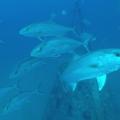Using Fishing Records to Assess Balance
Using Fishing Records to Assess Balance
You can determine the balance of bass and bream by closely examining your catch through fishing. This is much easier if you keep good catch and harvest records throughout the year (see the printable example below). Make sure to use a variety of types and sizes of lures or baits. When fishing produces large numbers of small bass and large bream, you probably have an overpopulation of bass. When only a few large bass and many small bream are caught, the pond is probably overpopulated with bream. Good catch rates of both bass and bream of all sizes indicate the pond is in balance.

To use the information from fishing records to determine where your pond is in terms of predator-prey balance, compare what you catch to the characteristics below.
Panel 1
- many small, often skinny bass
- few bream, but often large
- high catch rates
Panel 2
- bass and bream of various sizes
Panel 3
- few bass, tending to be large and often fat
- medium-size skinny bream abundant, few/no harvest size
News
BILOXI, Miss. -- The Southeast has some of the most commercially and recreationally valuable fisheries in the United States.
Fisheries experts at Mississippi State University and other research institutions are conducting an $11.7 million study of the greater amberjack, an important recreational and commercial species in the South Atlantic and Gulf of Mexico that is threatened by overfishing.
Grandpa cast the jig and cork to the center of the pond and handed it to Lucy. “Now, start reeling in slowly,” he said.





